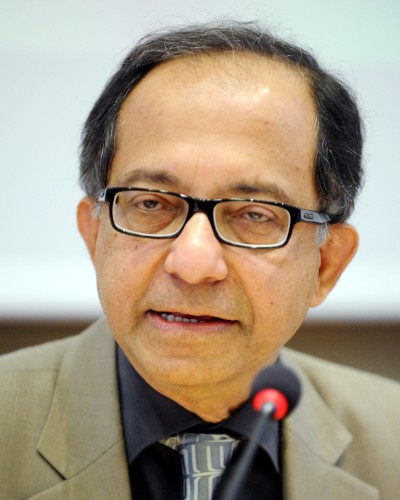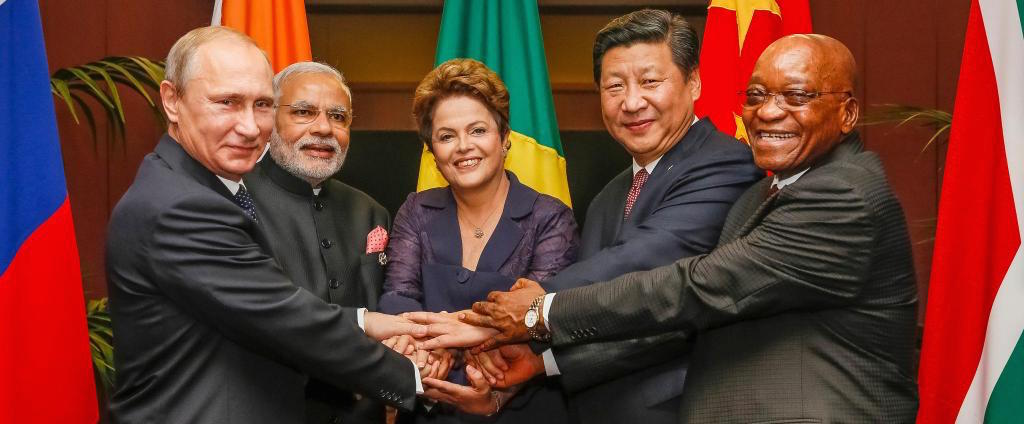By James Frkovich and Divyanshi Wadhwa
Dr. Kaushik Basu is Senior Vice President and Chief Economist at the World Bank. Last fall, Dr. Basu spoke to the Georgetown Public Policy Review about market trends in the BRICS nations, the future of emerging economies, and the World Bank.
Georgetown Public Policy Review (GPPR):Over the past year, growth in many emerging markets like the BRICS nations seems to have slowed down considerably. Do you think that this is a short-term setback or does it signal larger problems in emerging markets with reduced growth in the coming years?
Dr. Kaushik Basu (KB): In the five BRICS countries, there has been some slowdown, but more importantly, the divergence of growth has become very notable. In the second quarter of this year, Brazil’s economic growth was -0.29 percent and China’s economic growth was 7.5 percent. So there is a very big spread among just five nations. While there has been some slowdown, as in Russia, India has managed a decent level of economic growth at 5.7 percent. Am I expecting this to be a long-term trend? I can’t tell you about BRICS specifically, but for emerging economies, the average growth is going to pick up. The countries that are able to organize themselves moderately well will be able to take advantage of cheaper labor and begin to show moderate growth. So I expect in the medium term, growth is going to pick up.
GPPR: How do you think recent weak growth in Europe will affect emerging markets?
KB: The world is so connected today that a slowdown in any big economy transfers very quickly to elsewhere. The eurozone is a very large economy of the world and slowdown there is, unfortunately, going to have a negative effect on the developing world. My expectation of the eurozone is that there will not be any further shocks but they will experience a period of slow growth while they put their fiscal and banking policies in order. Once they restructure and put these policies back in order, the growth will pick up. Until then there will be a period of very slow growth, and that is indeed going to have some effect on developing countries.
GPPR: What kind of effects do you think emerging markets will feel when the US Federal Reserve raises interest rates?
KB: My own belief is that the effect on developing countries will not be big when the US Federal Reserve begins to raise interest rates for the following reason: when you announce that you are going to contain liquidity, taper off your quantitative easing, the announcement does give a shock. We saw that in 2013; after the announcement, the exchange rates were depreciating very sharply. But when the actual raising of interest rates takes place, there will be some negative effects but given that the US will raise interest rates only when the economy does well, and the economy doing well is such good news for rest of the world, that it will balance off some of the negative effects of raising the interest rate. I believe that when the actual interest rates are raised, there will be a negative effect, but only marginally so because of the good news of the American economy picking up.
GPPR: There has been some criticism of the World Bank in how it has carried out its mission to help the world’s poorest countries develop. How do you respond to that criticism and do you think that it is fair?
KB: Actually, I am relatively new to the World Bank, so I can still claim to speak somewhat with an outsider’s voice. It is very heartening to see the commitment within the World Bank, in addressing human development problems, beyond just economic growth. The World Bank has engaged with poverty, engaged with sharing of prosperity that the poor should share, as a country becomes better off. This shared prosperity target is new and was brought on the table in 2013—it is not just good enough to focus on the poorest; in every country there are people trailing behind and you want them to have a share in prosperity. I actually find the objectives of the World Bank to be very well motivated. How much success we will have is an open question simply because the world is a very difficult place. Although the World Bank is fairly large and fairly powerful, the world is huge and there are many forces that come into play. So these are noble aims that the World Bank is after, but it remains to be seen how much success we will have. I hope we will have a lot of success.
About Dr. Kaushik Basu

Kaushik Basu is the Senior Vice President for Development Economics and Chief Economist of the World Bank. Before serving in his current role at the World Bank Dr. Basu served as Chief Economic Advisor to the government of India and is currently on leave from Cornell University where he is a Professor of Economics.
James Frkovich conducted this interview in person at Georgetown University on October 23, 2014. This interview has been edited for length and clarity.
Feature Photo: cc/(Wikipedia)
Established in 1995, the Georgetown Public Policy Review is the McCourt School of Public Policy’s nonpartisan, graduate student-run publication. Our mission is to provide an outlet for innovative new thinkers and established policymakers to offer perspectives on the politics and policies that shape our nation and our world.
